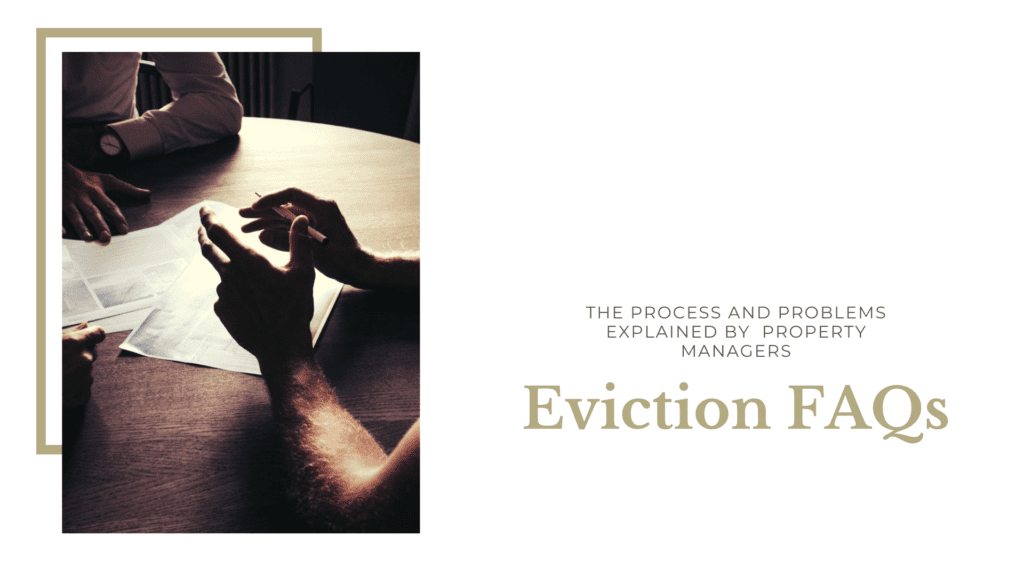
Eviction is always a last resort for owners and property managers who would prefer to avoid the lengthy and expensive process. However, when rent is not being paid or the lease is not being honored, you need to take decisive action and regain possession of your property.
With California’s just cause eviction laws, you need to make sure you have a valid reason for evicting your tenant. The most common reasons you will be able to legally evict a tenant are:
- Nonpayment of rent.
- Violation of the lease agreement.
- Illegal or criminal activities at the property.
Most of the landlords we help are evicting their tenants because of nonpayment of rent. So today, we’re helping to answer some of the most frequently asked questions we hear about evictions.
Before you move to evict, make sure there are not any eviction moratoriums or bans in place due to COVID that will impact your legal proceeding. Some tenants are still receiving protections, and you’ll want to make sure you have the legal standing to have your case heard by the courts.
Q: How Do I Know Where to Start?
Review your lease agreement before you take any action. In your lease, you will find the rent collection policy that your tenant agreed to. This should include information on late fees, grace periods, and the consequences of unpaid rent.
Q: Can I Contact My Tenant or Go Straight to Court?
Transparent communication and a good tenant relationship will help you avoid eviction.
Once your rent is officially late, you may want to contact your tenant to find out what happened. If it’s an otherwise good and responsible resident, it could be a simple case of a forgotten payment. Or, the tenant could be facing a temporary cash flow issue and may ask for a couple of days to come up with the rent that’s due.
Q: What is a Three Day Notice to Pay or Quit?
The Three Day Notice gives your tenant three days to pay the rent or move out of the property. In our experience, most tenants will catch up with the payment before the end of the three days. Again, with COVID-19, there are specific “rules of engagement” that will need to be considered prior to issuing a notice to the tenant. We highly recommend that you consult a qualified attorney to seek advice prior to acting.
Q: What if I Still Don’t Have Rent After Three Days?
After the proper waiting period has come and gone without payment or a notification that the tenants have moved out, you’ll need to go to the court and file for an eviction, which is legally referred to as an unlawful detainer. We highly recommend obtaining the assistance of a qualified eviction attorney that can represent your best interests.
Q: Do I Need a Lawyer?
You aren’t required to have legal representation to file this lawsuit, but we strongly recommend it. If you’re not already working with a San Diego property management company, consult an attorney who specializes in eviction law. It’s very easy to make an expensive mistake, and you don’t want to start the whole process over.
Q: What Happens at the Courthouse?
You’ll file the required paperwork and pay a fee. A court date will be set and your tenants will be informed. Sometimes, tenants will come up with the rent and the eviction will be called off. Or, they’ll move out of the property and you can get it back.
If the eviction goes all the way to court, and the tenants show up, the judge may require both parties to attempt a mediation. If this does not work, the court will hear both sides of the eviction case and if you can prove the simple fact that rent has not been paid, you will be awarded a judgment. Then, you’ll get a Writ of Possession and the tenants will be given a date by which they must vacate the home. While we are in the midst of COVID-19, please be aware there are special considerations that need to be outlined for you, which is why we recommend the involvement in your case by a qualified eviction attorney.
Q: What Happens if the Tenants Don’t Move Out Even After I Win?
In a worst-case scenario, the tenants won’t move out and you’ll need to summon the sheriff to physically remove them and their property.
 There are a lot of variables in the eviction process. That’s why it’s so important to consult a professional property manager and/or an attorney. If you’d like some help with this, please contact us at San Diego Residential Property Management.
There are a lot of variables in the eviction process. That’s why it’s so important to consult a professional property manager and/or an attorney. If you’d like some help with this, please contact us at San Diego Residential Property Management.

